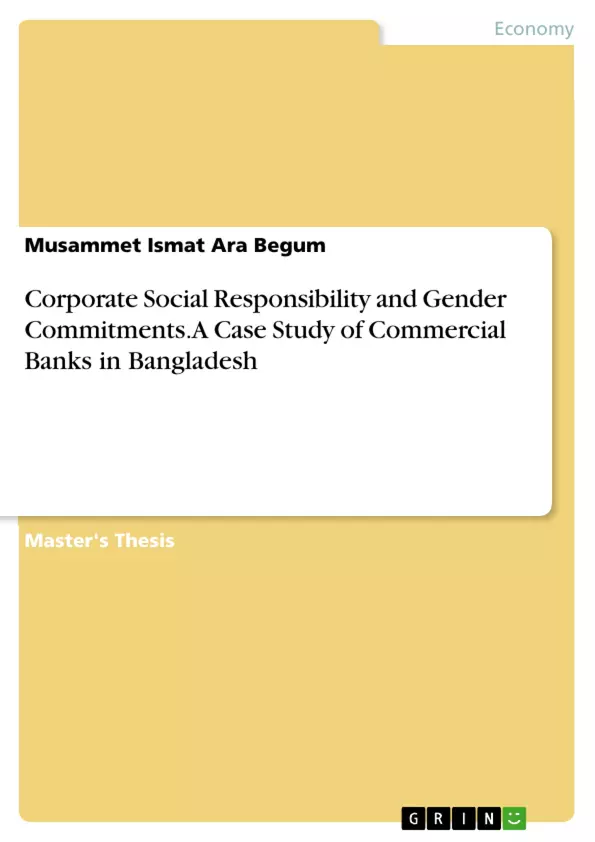This study analyses gender issues in the corporate social responsibility (CSR) frameworks of commercial banks in Bangladesh with reference to four theoretical perspectives on CSR: instrumental, political, integrative and ethical. It examines how gender issues are addressing in CSR framework and how it could advance gender equality issues and how CSR policies relating to gender are translated by the commercial banks to integrate gender equality in their reporting in Bangladesh Bank (The central bank of Bangladesh).
Based on the analysis of relevant data and information, it finds that gender issues of CSR are practicing mostly in instrumental and political way rather than integrative and ethical way due to regulatory requirement. However, the trends of practices are representing the positive approach to the integrative and ethical perspectives on gender issues in commercial banks of Bangladesh over time which could be proved in future for the time being.
Inhaltsverzeichnis (Table of Contents)
- SECTION 1: Introduction
- Focus and objectives of the project
- Research questions and propositions
- Overview of analytical framework and its application
- Research methodology
- Outline of the project
- SECTION 2: Analytical Framework
- Relationships between CSR, gender commitments and regulatory requirements
- Definitions and scope
- Corporate social responsibility
- Gender issues
- Regulatory requirements
- CSR, gender commitments and regulatory requirements: four theoretical perspectives
- Instrumental perspective
- Political perspective
- Integrative perspective
- Ethical perspective
- Concluding synthesis
- SECTION 3: Empirical Analysis
- Application of analytical framework
- Commercial banks of Bangladesh and regulation by Bangladesh Bank
- CSR activities of commercial banks in Bangladesh
- Gender in CSR activities of commercial banks: Initiatives from 2011
- Gender commitments in general
- Female percentage among board
- Female percentage among permanent employees
- Permanent female employees on break-down by age
- Turnover ratio
- Maternity leave policy
- Daycare facilities
- Transport facilities for women working beyond usual office hour
- Toilet facilities
- Gender awareness training for employees
- Sexual harassment policy and complaints
- Analysis of findings in accordance with four perspectives
- Instrumental perspective
- Political perspective
- Integrative and ethical perspectives
- Concluding synthesis
Zielsetzung und Themenschwerpunkte (Objectives and Key Themes)
This study examines the relationship between corporate social responsibility (CSR), gender commitments, and regulatory requirements in the context of commercial banks in Bangladesh. It aims to analyze the extent to which these banks incorporate gender equality into their CSR practices and how their commitments align with relevant regulations.
- The interplay of CSR, gender commitments, and regulatory frameworks in commercial banking.
- The application of theoretical perspectives to understand the drivers and motivations behind CSR and gender commitments in banks.
- An empirical analysis of the CSR activities and gender-related practices of commercial banks in Bangladesh.
- The evaluation of bank performance regarding gender equality in relation to different theoretical perspectives.
- The identification of potential limitations and suggestions for future research.
Zusammenfassung der Kapitel (Chapter Summaries)
The study begins with an introduction that outlines the research focus, objectives, and methodology. It then delves into the analytical framework, defining key terms and exploring theoretical perspectives on CSR, gender commitments, and regulatory requirements. The study then presents an empirical analysis of the CSR activities and gender-related practices of commercial banks in Bangladesh, focusing on initiatives undertaken since 2011. This analysis includes data on female representation in leadership positions, employee demographics, maternity leave policies, childcare facilities, and other gender-related workplace practices. The findings are then analyzed through the lens of the four theoretical perspectives outlined in the framework, highlighting their implications for the study's conclusions.
Schlüsselwörter (Keywords)
The primary focus of this study is on corporate social responsibility (CSR), gender commitments, and regulatory requirements in the banking sector of Bangladesh. It utilizes empirical analysis to explore the interplay between these elements, drawing on theoretical perspectives such as the instrumental, political, integrative, and ethical perspectives. The study aims to contribute to the understanding of CSR and gender equality practices in the context of commercial banks in Bangladesh.
Frequently Asked Questions
How is CSR practiced in the banking sector of Bangladesh?
CSR in Bangladeshi commercial banks is primarily driven by regulatory requirements from the central bank, often following instrumental and political perspectives rather than purely ethical ones.
What gender issues are addressed in these banks' CSR frameworks?
Key issues include female representation on boards, the percentage of permanent female employees, maternity leave policies, daycare facilities, and sexual harassment policies.
What are the four theoretical perspectives on CSR used in this study?
The study utilizes instrumental, political, integrative, and ethical perspectives to analyze how banks translate gender equality commitments into practice.
Is there a positive trend regarding gender equality in Bangladeshi banks?
Yes, the research indicates a positive shift towards more integrative and ethical approaches to gender issues over time, moving beyond simple regulatory compliance.
What role does the Bangladesh Bank play in CSR?
As the central bank, it sets the regulatory framework and reporting standards that commercial banks must follow regarding their corporate social responsibility and gender reporting.
- Quote paper
- Musammet Ismat Ara Begum (Author), 2015, Corporate Social Responsibility and Gender Commitments. A Case Study of Commercial Banks in Bangladesh, Munich, GRIN Verlag, https://www.grin.com/document/341411



